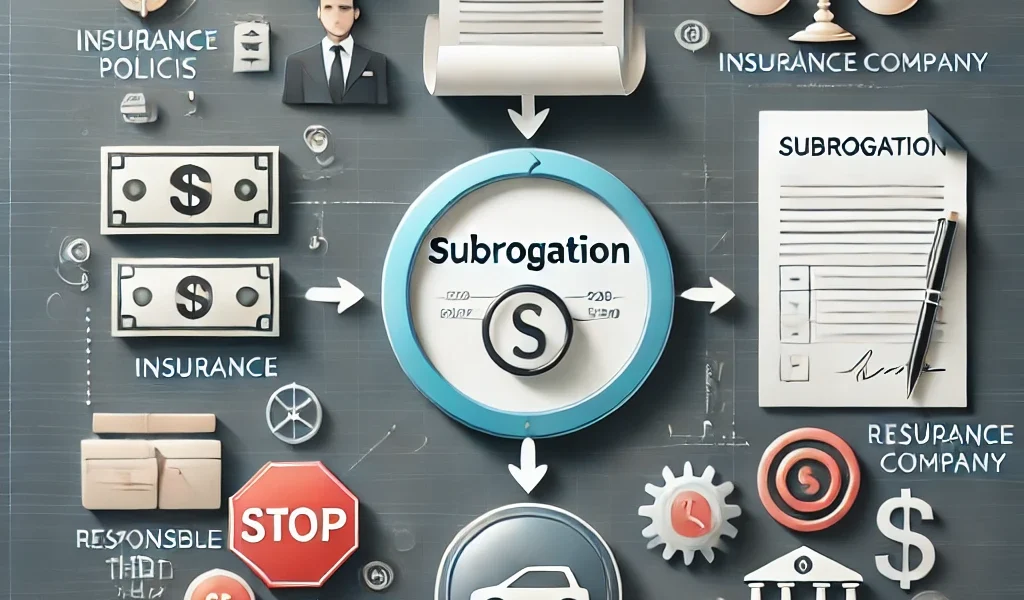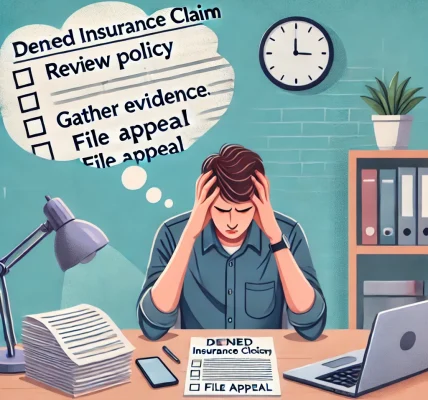Subrogation is a critical yet often overlooked aspect of insurance claims. Understanding what it is and how it works can help policyholders navigate their claims more effectively. In this guide, we’ll break down subrogation, its benefits, and what you should know to protect your interests.
1. Understanding Subrogation in Insurance
1.1 Definition of Subrogation
Subrogation is the process by which an insurance company seeks reimbursement from the at-fault party after paying a claim to its policyholder. Essentially, if your insurer pays for damages that another party is responsible for, they have the right to recover those costs from the liable party or their insurance company.
1.2 Why Does Subrogation Exist?
- Prevents policyholders from collecting twice for the same loss
- Ensures the at-fault party bears financial responsibility
- Helps keep insurance premiums lower by recovering costs
1.3 Common Scenarios Where Subrogation Applies
- Auto Accidents: If another driver is at fault for an accident, your insurer may pay for damages and then seek reimbursement from the other driver’s insurance.
- Property Damage: If a third party’s negligence leads to home or property damage, your insurer may recover costs from the responsible party.
- Health Insurance Claims: If your health insurer covers medical expenses caused by another party, they may seek compensation from the at-fault person’s insurer.
2. How the Subrogation Process Works
2.1 Step 1: The Insurance Company Pays the Claim
Once you file a claim and your insurer determines that another party is responsible, they may pay for your damages upfront.
2.2 Step 2: The Insurance Company Investigates Liability
Your insurer will gather evidence to prove the liability of the third party. This may include:
- Police reports
- Witness statements
- Photos and videos of the accident
- Expert evaluations
2.3 Step 3: The Insurance Company Pursues Reimbursement
After proving liability, your insurer will seek repayment from the responsible party or their insurance provider. This can happen in three ways:
- Direct negotiation between insurance companies
- Legal action if negotiations fail
- Arbitration as an alternative dispute resolution
2.4 Step 4: Policyholder Compensation (If Applicable)
If you have already paid a deductible, you may receive reimbursement once the insurer successfully recovers funds from the at-fault party.
3. Policyholder Rights & Responsibilities in Subrogation
3.1 Your Rights as a Policyholder
- You must be informed if your insurer initiates subrogation.
- You have the right to receive your deductible back if the insurer recovers funds.
- You cannot interfere with your insurer’s subrogation efforts (e.g., signing waivers that release the responsible party from liability).
3.2 Your Responsibilities
- Cooperate with your insurer by providing necessary documents and statements.
- Do not accept settlements from the at-fault party without consulting your insurer.
- Inform your insurer if the at-fault party contacts you directly regarding payment.
4. Subrogation Waivers: What You Need to Know
4.1 What Is a Waiver of Subrogation?
A waiver of subrogation is an agreement that prevents your insurer from seeking reimbursement from a third party. These waivers are commonly included in contracts in industries such as:
- Construction
- Lease agreements
- Business contracts
4.2 When Should You Consider a Waiver of Subrogation?
- If it is required as part of a contract
- If waiving subrogation allows for better business relationships
- If both parties agree that each will be responsible for their own insurance claims
4.3 Risks of Signing a Waiver of Subrogation
- Your insurer may refuse to cover your claim if you waive their right to subrogation.
- You may be personally responsible for losses that could have been recovered.
5. How Subrogation Affects Insurance Claims & Premiums
5.1 Impact on Your Claims Process
- If your insurer recovers funds, your claim may be closed sooner.
- You may receive reimbursement for your deductible.
5.2 Does Subrogation Affect Your Insurance Premiums?
- If subrogation is successful, it may prevent your premiums from increasing.
- If the insurer cannot recover funds, your claim history could impact future premiums.
5.3 Can You Negotiate a Subrogation Claim?
- In some cases, you can negotiate the amount owed if you believe the insurer’s claim is excessive.
- If legal action is involved, consulting a lawyer may be beneficial.
6. Frequently Asked Questions About Subrogation
6.1 Can I Refuse Subrogation?
No, most insurance policies include a subrogation clause that requires cooperation.
6.2 How Long Does Subrogation Take?
The process can take weeks to months, depending on the complexity of the case and whether the at-fault party disputes liability.
6.3 What Happens If the At-Fault Party Doesn’t Pay?
If the responsible party refuses to pay, the insurer may take legal action or absorb the loss, potentially affecting your future premiums.
Final Thoughts
Subrogation is a crucial part of the insurance claims process that helps insurers recover costs while protecting policyholders from financial burden. By understanding how subrogation works, you can ensure compliance with your insurance policy, maximize your claim benefits, and avoid common pitfalls.
Always review your policy details and consult your insurer if you have any concerns about subrogation and how it may impact your claim.




